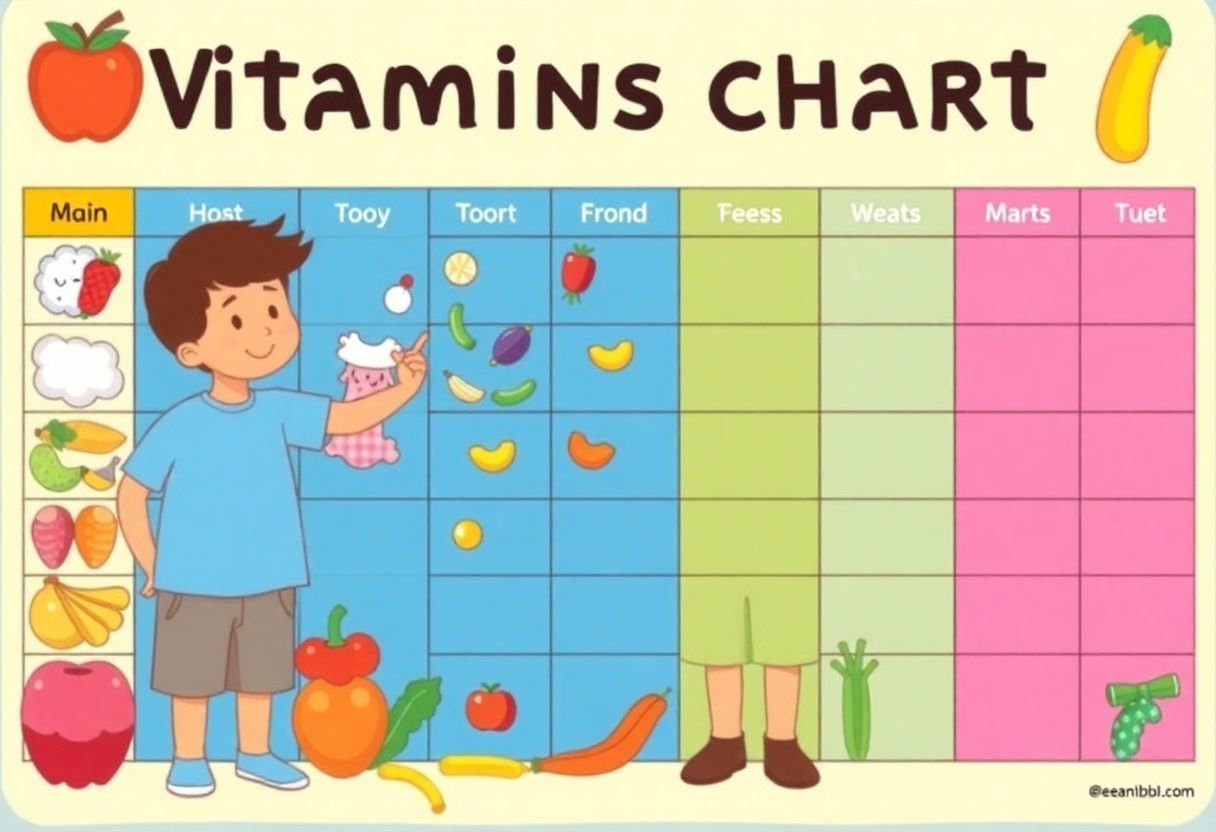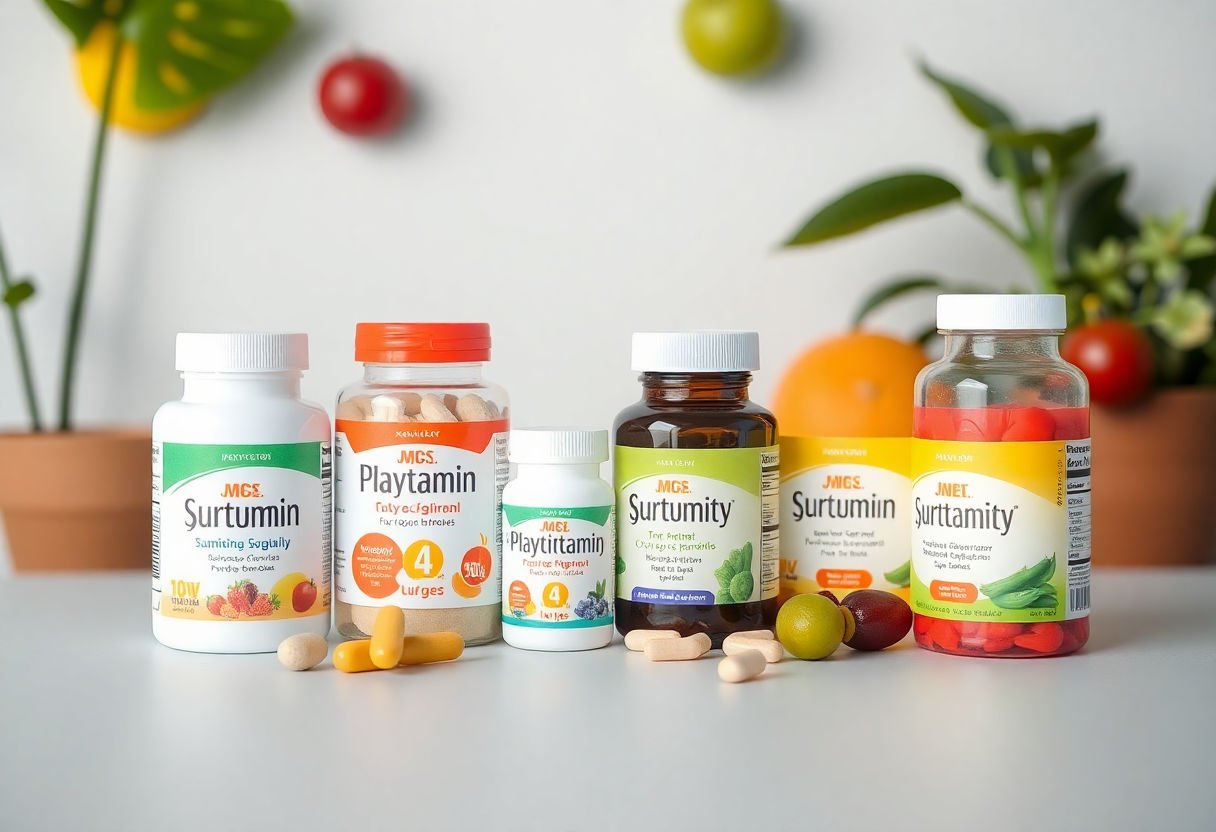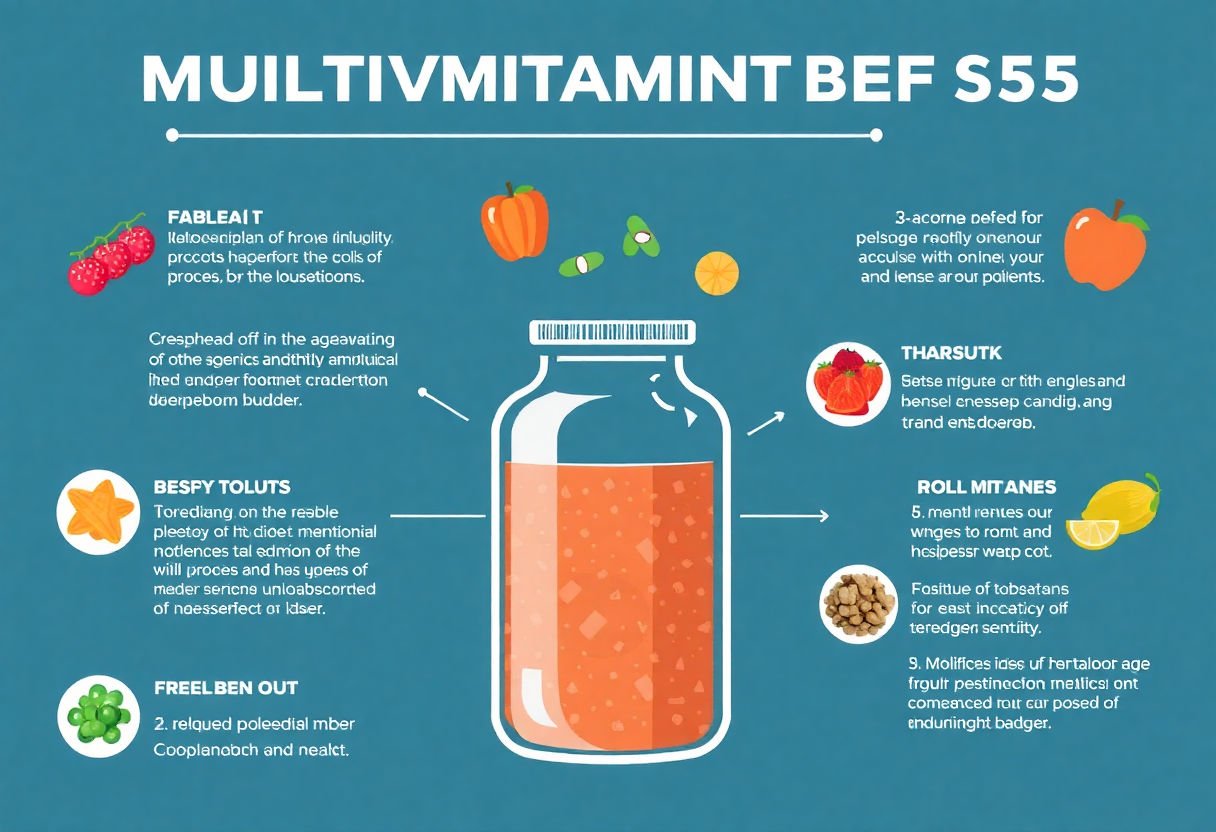Ensuring your child receives the proper nutrients is paramount for their health and development. Multivitamins with iron play a vital role in supporting children’s growth, enhancing their immune systems, and boosting overall well-being. These supplements are particularly important for cognitive and physical development, especially if dietary intake falls short. This comprehensive guide will delve into the benefits of multivitamins with iron, how to recognize when your child might need supplementation, and practical tips on choosing the best options. By integrating these supplements effectively, you can help lay a strong foundation for your child’s future health.
Key Takeaways
- Multivitamins with iron are essential for supporting children’s growth and boosting their overall health.
- Iron plays a vital role in cognitive and physical development, preventing potential deficiencies.
- Look for high-quality multivitamin options that meet children’s dietary needs without compromising safety.
- Including multivitamins in daily routines can enhance children’s energy levels, immune function, and concentration.
- Always consult a pediatrician before starting any supplement regimen to ensure it aligns with your child’s health requirements.
Understanding the Role of Vitamins in Child Development

Vitamins play a foundational role in child development, influencing everything from growth to immune health. These essential nutrients act as catalysts for numerous biochemical reactions in the body, ensuring that children not only grow but thrive.
Vitamin A is crucial for maintaining healthy vision, skin, and immune function. It supports the body’s ability to fight infections, which is essential during the early years of life when children’s immune systems are still developing.
B-vitamins, including B12 and folate, are vital for energy production and the formation of red blood cells. They support a growing child’s ability to concentrate and perform cognitive tasks, laying the groundwork for success in learning environments.
Vitamin C acts as a powerful antioxidant, protecting cells from damage and playing a vital role in the synthesis of collagen, necessary for the development of muscles, tissues, and skin. Its immune-boosting properties help safeguard children against common childhood illnesses.
Vitamin D is known as the “sunshine vitamin,” critical for the absorption of calcium, thereby ensuring strong bones and teeth. This is particularly important during growth spurts.
Vitamin E supports a healthy heart and skin, serving as another antioxidant that helps protect against environmental damage and supports optimal development.
Lastly, Vitamin K is essential for blood clotting and maintaining strong bones. These vitamins collectively contribute to the holistic development of children, underlining the importance of a balanced diet and, when necessary, the inclusion of a multivitamin to fill nutritional gaps.
The Importance of Iron in Children’s Diets
Iron is an essential nutrient that plays a crucial role in a child’s development. It is primarily responsible for forming hemoglobin, the component in red blood cells that carries oxygen throughout the body. Without adequate iron, children can suffer from iron deficiency anemia, which can lead to fatigue and weakened immunity.
Cognitive and Physical Development: Iron is vital for brain development, especially during the formative years. It supports the production of neurotransmitters, which are chemicals that transmit signals in the brain, significantly influencing cognitive functions such as concentration, memory, and alertness. Physical growth also heavily depends on iron; it aids in muscle function and overall energy levels, supporting a child’s active lifestyle.
When children don’t get enough iron from their diet, symptoms may include:
- Fatigue and reduced stamina
- Pale skin and shortness of breath
- Difficulty in maintaining body temperature
- Decreased appetite
While iron-rich foods like red meats, beans, and fortified cereals are excellent sources, many children may not consume sufficient amounts consistently, leading to potential deficiencies.
Integrating a multivitamin with iron into a child’s diet can ensure they receive an adequate amount of this vital nutrient, particularly for picky eaters. It’s important that parents choose a supplement that aligns with their child’s dietary needs, considering factors like age and specific health requirements. By doing so, they can effectively support their child’s growth and cognitive development, ensuring a foundation for a healthy, active life.
Signs Your Child Might Need a Multivitamin

Children’s nutritional needs can often go unmet due to dietary restrictions, picky eating habits, or specific health conditions. Identifying signs that your child might need a multivitamin is crucial in ensuring their optimal health and development. Fatigue and low energy levels can be indicators that your child is not receiving adequate nutrients, especially iron and B vitamins, which are essential for energy production.
If your child frequently falls sick or exhibits a weakened immune response, they may not be getting enough vitamins A, C, and D, as well as zinc. These nutrients play a vital role in supporting immune function. Another symptom to watch out for is poor concentration and difficulty in focusing, which can be linked to deficiencies in iron and essential fatty acids. These nutrients are pivotal for cognitive development and brain health.
Brittle nails, dry hair, and skin issues can signal a lack of vitamins like biotin, vitamin E, and omega fatty acids. These vitamins are important for maintaining healthy skin and hair. Lastly, if your child has poor appetite and irregular growth patterns, it could indicate a deficiency in multiple nutrients that are necessary for healthy growth and development.
Including a multivitamin supplement that addresses these specific needs can be beneficial. However, it is essential to consult with a healthcare provider to assess your child’s unique nutritional requirements before starting any supplementation.
Choosing the Best Multivitamin with Iron for Kids

When selecting the ideal multivitamin with iron for your child, several crucial factors need to be considered. Firstly, it is essential to ensure that the multivitamin is age-appropriate and offers the necessary nutrients required for your child’s specific developmental stage. Each age group has distinct nutritional needs, hence the importance of choosing a formula tailored for your child’s age.
Pay close attention to the ingredient list. Opt for products with no artificial colors, flavors, or preservatives to avoid unnecessary additives. Additionally, check the levels of each vitamin and mineral. While iron is crucial, too much can be harmful, so ensure the dosage is appropriate as per the recommended daily allowance for your child’s age.
It’s also imperative to look for multivitamins that have undergone third-party testing to verify their quality and potency. Reputable brands often have certifications from independent organizations that affirm the product’s safety and effectiveness. This additional verification can assure you of the product’s quality.
Consider the form of the multivitamin. Some children may prefer chewable tablets or gummies, while others might find liquid forms easier to swallow. Choose one that your child will take consistently without difficulty.
Lastly, consulting with a pediatrician can provide personalized guidance based on your child’s health requirements and dietary habits. A healthcare provider can recommend specific supplements that best address your child’s nutritional needs, ensuring optimal health outcomes. By taking these factors into account, you can confidently select a high-quality multivitamin with iron that supports your child’s growth and development.
Benefits of Multivitamins with Iron

Multivitamins with iron offer a wealth of advantages that are integral to enhancing the health and development of children. These supplements are especially important in addressing nutritional gaps that might occur in a child’s diet. By providing a balanced intake of essential vitamins alongside iron, such supplements can significantly bolster a child’s energy levels, as iron is a critical component of hemoglobin which helps transport oxygen throughout the body. This improvement in energy can markedly enhance a child’s playtime engagement and daily learning activities.
Furthermore, a robust immune system is vital for children, particularly in school settings where they are exposed to numerous germs. Multivitamins with iron can augment the immune system’s defenses, ensuring that children can fend off common illnesses more effectively. This preventive aspect is crucial for maintaining consistent school attendance and reducing the frequency of sick days.
Additionally, these supplements can play a role in enhancing cognitive function. Iron is essential in supporting brain development and function, influencing memory and concentration. Consequently, children who receive adequate iron and other vital vitamins through these supplements are often better equipped to focus and perform well academically.
The intake of multivitamins with iron is also pivotal in safeguarding against potential nutrient deficiencies, which can lead to various health issues. By including these supplements in a child’s routine, parents can provide an extra layer of nutritional insurance, promoting overall well-being and aiding in the child’s holistic growth and development.
How to Integrate Multivitamins into Your Child’s Routine
To seamlessly integrate multivitamins into your child’s routine, consider a few strategic approaches that can turn a potential struggle into an easygoing habit. Ensuring that your child perceives taking multivitamins as a natural part of daily life can significantly enhance adherence and effectiveness.
Create a Consistent Schedule: Tie the vitamin intake to regular daily activities, such as breakfast or after-school snack time, to help your child remember and embrace it as part of their routine. Consistency not only reinforces the habit but also aligns with the body’s natural absorption patterns.
Involve Your Child in the Process: Let your child select their multivitamins, whether through choosing flavors or discussing the benefits alongside their caregivers. By understanding why they are taking multivitamins, children can feel more engaged and responsible for their health.
Use Positive Reinforcement: Praise your child each time they take their supplement. Positive reinforcement can help in instilling long-term healthy behavior and making the process enjoyable. Remember, children respond well to encouragement, making them more likely to maintain the habit.
Integrate with Fun Activities: Gamify the process by incorporating fun activities. Use charts to track intake, and offer small rewards for milestones achieved. Lovingly integrating these fun elements can transform a mundane task into an exciting part of their daily routine.
Lastly, ensure that the chosen multivitamin is tailored to your child’s age and specific nutritional needs, as this ensures the highest efficacy and safety standards are met. By embedding these practices into everyday life, parents can support their children’s nutritional health in a seamless and effective manner.
Common Myths About Multivitamins for Kids
While multivitamins can play a supportive role in children’s nutrition, several myths have clouded their appropriate use. One common misconception is that multivitamins can replace a balanced diet. In reality, even the best multivitamins with iron cannot substitute the benefits of whole foods, which provide dietary fiber, essential fats, and other nutrients necessary for healthy growth.
Another prevalent myth is that all children need multivitamins. While they can be beneficial for certain individuals, particularly those with restrictive diets or dietary insufficiencies, not every child requires supplementation. A balanced diet that provides all essential nutrients typically makes a multivitamin unnecessary. It’s important to consult with a pediatrician to determine specific needs based on a child’s health and nutrition status.
A third myth is the belief that more is better. This is particularly dangerous because excessive intake of certain vitamins and minerals can be harmful. For example, an overdose of iron can lead to toxicity. Therefore, it is crucial to adhere to recommended dosages and guidelines.
There’s also a mistaken notion that multivitamins can solve health problems. While they might fill certain nutritional gaps, they are not a cure-all for underlying health issues. Proper medical advice should always be sought for any health concerns.
Finally, some believe that multivitamins can enhance intelligence or athletic performance. While they support overall health, there’s no scientific evidence supporting the notion that they can directly boost cognitive or physical abilities.
When to Consult a Pediatrician

When it comes to iron supplementation through multivitamins for kids, seeking professional medical advice is crucial under several circumstances. Consulting a pediatrician will help ensure that your child’s unique health needs are adequately met and that supplementation is both safe and effective.
-
Persistent Fatigue and Weakness: If your child consistently exhibits symptoms of fatigue, weakness, or pallor, it may be indicative of iron-deficiency anemia. A pediatrician can provide a proper diagnosis and recommend the appropriate dosage of iron supplementation.
-
Dietary Restrictions or Special Needs: Children with specific dietary restrictions, such as vegetarians or those with allergies that limit their intake of iron-rich foods, should be evaluated by a pediatrician to determine if a multivitamin with iron is necessary to prevent deficiencies.
-
Pre-existing Health Conditions: Kids with certain health conditions, such as celiac disease or inflammatory bowel diseases, may have compromised absorption of nutrients. In such cases, a pediatrician can recommend tailored supplementation strategies to support overall health and development.
-
Growth Spurts: During periods of rapid growth, children have increased nutritional demands. A pediatrician can assess whether additional supplementation may benefit your child during these critical developmental stages.
Parents should also seek medical advice if there are unexpected reactions to multivitamins, such as gastrointestinal discomfort or allergic reactions. Additionally, routine check-ups with a pediatrician can help monitor your child’s overall health and ensure that they are receiving the optimal balance of nutrients for their development.
Conclusion
In summary, ensuring your child receives the right multivitamins with iron is pivotal for fostering robust growth, cognitive development, and a resilient immune system. Recognizing signs of deficiency and choosing high-quality supplements can significantly enhance your child’s well-being. As future health trajectories are shaped by early nutritional choices, parents are encouraged to integrate these vitamins into their child’s daily routine prudently. Always consider consulting a pediatrician to tailor a plan that suits individual health needs. By prioritizing adequate nutrition, you lay a strong foundation for your child’s health and happiness.
Frequently Asked Questions
Are multivitamins with iron safe for children of all ages?
Multivitamins with iron are generally safe for children; however, it is important to consult a pediatrician before starting any supplement, as individual needs can vary based on age and health conditions.
How can I tell if my child needs a multivitamin with iron?
If your child shows signs of fatigue, weakness, or poor concentration, it may indicate an iron deficiency or lack of essential vitamins, necessitating a consult with a healthcare professional.
What is the recommended dosage of multivitamins with iron for children?
Dosage guidelines should follow the recommendations on the product label and your pediatrician’s advice, considering the specific needs of your child to avoid excess intake.
Can multivitamins with iron improve my child’s academic performance?
Multivitamins with iron are known to support cognitive development, potentially enhancing concentration and memory, which may indirectly benefit academic performance.
Are there any side effects of giving children multivitamins with iron?
While uncommon, side effects may include stomach upset or constipation. Monitoring and reporting any adverse reactions to a healthcare provider are crucial.


